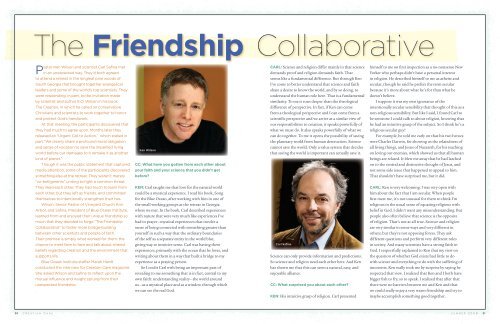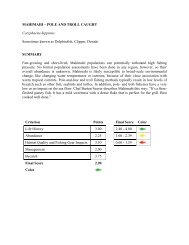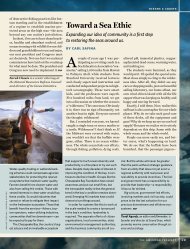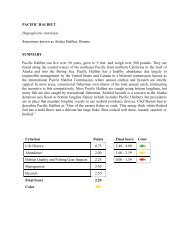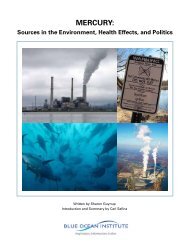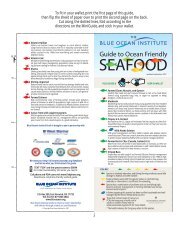Ken - Blue Ocean Institute
Ken - Blue Ocean Institute
Ken - Blue Ocean Institute
Create successful ePaper yourself
Turn your PDF publications into a flip-book with our unique Google optimized e-Paper software.
The Friendship Collaborative<br />
Pastor <strong>Ken</strong> Wilson and scientist Carl Safina met<br />
in an unexpected way. They’d both agreed<br />
to attend a retreat in the longleaf pine woods of<br />
South Georgia that brought together evangelical<br />
leaders and some of the world’s top scientists. They<br />
were responding, in part, to the invitation made<br />
by scientist and author E.O. Wilson in his book<br />
The Creation, in which he called on conservative<br />
Christians and scientists to work together to honor<br />
and protect God’s handiwork.<br />
At that meeting, the participants discovered that<br />
they had much to agree upon. Months later they<br />
released an “Urgent Call to Action,” which stated in<br />
part “We clearly share a profound moral obligation<br />
and sense of vocation to save the imperiled living<br />
world before our damages to it remake it as another<br />
kind of planet.”<br />
Though it was the public statement that captured<br />
media attention, some of the participants discovered<br />
something else at the retreat. They weren’t merely<br />
“co-belligerents” uniting to fight a common threat.<br />
They liked each other. They had much to learn from<br />
each other, but they left as friends, and committed<br />
themselves to intentionally strengthen their ties.<br />
Wilson, Senior Pastor of Vineyard Church Ann<br />
Arbor, and Safina, President of <strong>Blue</strong> <strong>Ocean</strong> <strong>Institute</strong>,<br />
learned from and enjoyed their unique friendship so<br />
much that they decided to forge “The Friendship<br />
Collaborative” to foster more bridge-building<br />
between other scientists and people of faith.<br />
Their premise is simply what worked for them: the<br />
chance to meet face to face and talk about shared<br />
beliefs regarding creation and the environment that<br />
supports life.<br />
<strong>Blue</strong> <strong>Ocean</strong> <strong>Institute</strong> staffer Marah Hardt<br />
conducted the interview for Creation Care magazine.<br />
She asked Wilson and Safina to reflect upon the<br />
mutual influence and insight sprung from their<br />
unexpected friendship.<br />
.<br />
<strong>Ken</strong> Wilson<br />
CC: What have you gotten from each other about<br />
your faith and your science that you didn’t get<br />
before?<br />
KEN: Carl taught me that love for the natural world<br />
could be a mystical experience. I read his book, Song<br />
for the <strong>Blue</strong> <strong>Ocean</strong>, after working with him in one of<br />
the small working groups at the retreat in Georgia<br />
where we met. In the book, Carl described experiences<br />
with nature that were very much like experiences I’ve<br />
had in prayer—mystical experiences that involve a<br />
sense of being connected with something greater than<br />
yourself in such a way that the ordinary boundaries<br />
of the self as a separate entity in the world blur,<br />
giving way to intuitive sense. Carl was having these<br />
experiences, primarily with the ocean that he loves, and<br />
writing about them in a way that built a bridge to my<br />
experience as a praying person.<br />
So I credit Carl with being an important part of<br />
revealing to me something that is in fact, central to my<br />
own faith: understanding reality—the world around<br />
us—as a mystical place and as a window through which<br />
we can see the real God.<br />
CARL: Science and religion differ mainly in that science<br />
demands proof and religion demands faith. That<br />
seems like a fundamental difference. But through <strong>Ken</strong><br />
I’ve come to better understand that science and faith<br />
share a desire to know the world, and by so doing, to<br />
understand the human role here. That is a fundamental<br />
similarity. To me it runs deeper than the theological<br />
difference of perspective. In fact, if <strong>Ken</strong> can come<br />
from a theological perspective and I can come from a<br />
scientific perspective and we arrive at a similar view of<br />
our responsibilities to creation, it speaks powerfully of<br />
what we must do. It also speaks powerfully of what we<br />
can do together. To me it opens the possibility of saving<br />
the planetary world from human destruction. Science<br />
cannot save the world. Only a value system that decides<br />
that saving the world is important can actually save it.<br />
Carl Safina<br />
Science can only provide information and predictions.<br />
So science and religion need each other here. And <strong>Ken</strong><br />
has shown me that this can seem a natural, easy, and<br />
enjoyable alliance.<br />
CC: What surprised you about each other?<br />
KEN: His intuitive grasp of religion. Carl presented<br />
himself to me on first inspection as a no-nonsense New<br />
Yorker who perhaps didn’t have a personal interest<br />
in religion. He described himself to me as atheist and<br />
secular, though he said he prefers the term secular<br />
because it’s more about what he’s for than what he<br />
doesn’t believe.<br />
I suppose it was my own ignorance of the<br />
intentionally secular sensibility that thought of this as a<br />
non-religious sensibility. But like I said, I found Carl to<br />
be someone I could talk to about religion, knowing that<br />
he had an intuitive grasp of the subject. So I think he’s a<br />
religious secular guy!<br />
For example, he told me early on that his two heroes<br />
were Charles Darwin, for showing us the relatedness of<br />
all living things, and Jesus of Nazareth, for his teaching<br />
on loving our enemies, which showed us that all human<br />
beings are related. It blew me away that he had latched<br />
on to the central and distinctive thought of Jesus, and<br />
not some side issue that happened to appeal to him.<br />
That shouldn’t have surprised me, but it did.<br />
CARL: <strong>Ken</strong> is very welcoming. I was very open with<br />
him about the fact that I am secular. When people<br />
first meet me, it’s not unusual for them to think I’m<br />
religious in the usual sense of equating religious with<br />
belief in God. I didn’t want any misunderstanding. But<br />
people also often believe that science is the opposite<br />
of religion. That’s not at all true. Science and religion<br />
are very similar in some ways and very different in<br />
others, but they’re not opposing forces. They ask<br />
different questions and perform very different roles<br />
in society. And many scientists have a strong faith in<br />
God. I respectfully explained to <strong>Ken</strong> that my view on<br />
the question of whether God exists had little to do<br />
with science and everything to do with the suffering of<br />
innocents. <strong>Ken</strong> really took me by surprise by saying he<br />
respected that view. I realized that <strong>Ken</strong> and I both have<br />
bigger fish to fry, so to speak. I realized that after that<br />
there were no barriers between me and <strong>Ken</strong> and that<br />
we could really enjoy a very warm friendship and try to<br />
maybe accomplish something good together.<br />
20 Cr e a t i o n Ca r e<br />
s u m m e r 2008 21
The Friendship Collaborative<br />
“I was afraid ken would not respect my beliefs, and he dispelled that fear by accepting my views on the<br />
CC: What do you have in common that you might<br />
not have realized before?<br />
KEN: It sounds strange to say, me being such a chronic<br />
hopelessly religious or spiritual person of the Christian<br />
variety, but I feel like I have a worldview, or at least<br />
major parts of a worldview, in common with Carl. As<br />
an ecologist or conservationist (I’m never quite sure<br />
what Carl is, but I know he’s one of those!), Carl is a<br />
bit of a zealot—meaning a man with a mission that he<br />
passionately pursues. And, like a believer such as myself,<br />
his vision has an apocalyptic quality to it—meaning<br />
he sees things looming on the horizon that could<br />
devastate life as we know it. He even views himself, if<br />
I’m not being presumptuous here, as someone who<br />
has some important message that more people ought<br />
to be listening to and if they did, the world would be<br />
a better place. And he’s part of a minority group that<br />
wants to convince the world to act differently. So, in a<br />
lot of unexpected ways, we see the world through a very<br />
similar set of lenses.<br />
CARL: I took from my religion (I’d been raised<br />
Catholic) the importance of compassion, concern for<br />
the less fortunate, the challenge of loving one’s enemies<br />
as a matter of immense practical value, and a deep<br />
sense of reverence and awe for the living world and the<br />
great universe. I am, in a very real sense, a person with<br />
a mission to help save the world—the natural world,<br />
creation—from our sins, to put it in those terms. I think<br />
<strong>Ken</strong> and I are similar enough to really understand<br />
each other, or at least to be really comfortable as we get<br />
to better understand each other. Our interests aren’t<br />
identical, but they broadly overlap. The fundamental<br />
similarity is that I buy what Jesus was talking about.<br />
And <strong>Ken</strong> sure does. A lot of the practicing “faithful”<br />
may believe firmly in God but they don’t seem to have<br />
heard Jesus’s message of love, peace and compassion.<br />
<strong>Ken</strong> sure gets it. I think I get it. So in a sense, one can be<br />
faithful to the message (or, rather, can strive to live up<br />
to the challenge of the message) even without believing<br />
in the theology. For me the message—and what we do<br />
with the message—is more important than what we<br />
believe about the author of the message. <strong>Ken</strong> believes<br />
Jesus is God, but I don’t. That difference is, for me,<br />
rather beside the point. The point is whether we take<br />
up this immense challenge, and whether we will use it<br />
to save the world from ruin. I think <strong>Ken</strong> and I are both<br />
very concerned with the challenge and convinced of the<br />
rightness of it; that’s a deep similarity I feel.<br />
CC: What’s the most pointed question or concern<br />
that you’ve raised with each other?<br />
KEN: I asked Carl why environmental scientists who<br />
tend to view living things as populations weren’t raising<br />
more of an alarm about abortion practices in places like<br />
India and China, where there is now a gender imbalance<br />
introduced into the human population through sexselected<br />
abortions favoring the abortion of female<br />
unborn babies. I said that it seems to me that biologists,<br />
of all the disciplines, should be alarmed by this and<br />
concerned about the perils of messing with mother<br />
nature in this way. And that I thought it was something<br />
more like political correctness in the worst sense that<br />
kept them, as scientists, from speaking out against this<br />
practice.<br />
CARL: I don’t question <strong>Ken</strong>’s beliefs. But I was afraid<br />
he would not respect mine, and he quickly dispelled<br />
that fear by accepting my views on the problem of<br />
suffering. And we’ve been over the hot-button issues<br />
that have been so destructive to America—abortion,<br />
evolution, homosexuality. It’s part of the trueness of<br />
<strong>Ken</strong>’s compassion that we can talk about these things.<br />
Some religious people can be so rigid on these topics<br />
that they can’t even talk about them. I think a few<br />
religious leaders have used these topics as wedges to<br />
drive America apart so as to draw lines, emphasize<br />
differences, and win politically. That strikes me as both<br />
deeply un-Christian and deeply un-American. <strong>Ken</strong><br />
realizes the world is complicated, and he’s so secure<br />
in his views and his faith that he can talk about these<br />
issues. I’m very appreciative of that.<br />
CC: How has your interaction changed your<br />
perspectives about human interactions with<br />
nature?<br />
KEN: Carl has given me a more global perspective about<br />
how the things we do in our ordinary lives impact<br />
nature on a global scale. His book about the Albatross<br />
helped me see the ocean with new eyes. That image of<br />
baby albatross birds choking on plastic toothbrushes<br />
that the parents regurgitated into their throats from<br />
debris ingested from the ocean—man, that was a worldrocking<br />
image! I throw away stuff like that all the time<br />
without a thought about where it ends up. And now<br />
I see that as a moral issue and myself in need of some<br />
moral reforming.<br />
I suppose, like most people, I viewed the ocean as<br />
this pristine wilderness unaffected by humans. But now<br />
I see the ocean as something we’re treating like a free<br />
dumping place. I must say, I was completely ignorant,<br />
and my ignorance was of the worst sort because it was<br />
completely self-serving and convenient to be ignorant.<br />
CARL: <strong>Ken</strong> has helped affirm that my view of the<br />
human interaction with nature as part of a moral<br />
continuum is a valid view. That is of great value to<br />
me. It means we science-types can work together with<br />
people of faith on matters of nature from a creation<br />
perspective. He has helped me see, and also helped<br />
affirm, that poverty doesn’t just happen to people.<br />
When we impoverish nature, we also impoverish people.<br />
And that is a clearly religious concern.<br />
CC: How has your relationship changed how you<br />
discuss environmental or religious issues with<br />
others?<br />
KEN: It’s given me a little gumption, a little nerve,<br />
a little fire in the belly. Unfortunately, evangelical<br />
churches in the United States have been a kind of<br />
gathering place for people who feel comfortable not<br />
caring too much about “environmental concerns” or<br />
who view them as the effete concerns of the academic<br />
elites who don’t have the normal problems of everyday<br />
people so they can afford to be upset about the spotted<br />
owls. That can create a social environment where people<br />
who do care about the environment get intimidated<br />
or put the muzzle on their passion. It can feel like a<br />
passion that somehow isn’t a faith-generated passion.<br />
It’s more like a hobby than a central concern of faith.<br />
But I find Carl’s passion about the environment to<br />
be nothing but sane and reasonable and completely<br />
in keeping with my faith. So he’s given me a little<br />
backbone on this issue.<br />
CARL: Mainly, because <strong>Ken</strong> views this as a moral<br />
matter, it helps me talk to scientists about the<br />
environment not just as a matter of new findings<br />
and lines on graphs, not just about trends in animal<br />
populations, but as a matter of universal moral<br />
concern. Morality is powerful because it’s more<br />
conservative than the way most environmentalists<br />
approach the issues. Environmentalists ask, “Is this<br />
sustainable?” This is a sound question but it’s more<br />
open to fudging and abuse and lip-service by people<br />
whose real interests lie elsewhere, so it doesn’t get<br />
applied well. The moral perspective sets a higher<br />
standard, asking, “Is this right, or is it wrong?” That<br />
is more difficult to answer in a complex world. But if<br />
we’d taken that view all along, we’d have gone slower,<br />
and we wouldn’t be facing the dangerous situations<br />
we’ve created. Fundamentally, understanding <strong>Ken</strong>’s<br />
views about the morality of our relationship to creation<br />
allows me to speak openly about life on planet Earth as<br />
a matter of the most basic and most crucial practical<br />
as well as moral importance to all people, everywhere.<br />
Frankly, I think more people will be able to hear that<br />
message.<br />
For more information on forging surprising<br />
friendships, visit www.thefriendshipproject.org .<br />
To read about the original meeting and the “Urgent<br />
Call to Action” go to http://chge.med.harvard.edu/<br />
media/releases/jan_17.html<br />
Carl Safina is President of <strong>Blue</strong> <strong>Ocean</strong> <strong>Institute</strong>.<br />
<strong>Ken</strong> Wilson is Senior Pastor of Vineyard Church of Ann<br />
Arbor, MI and Regional Overseer of the Great Lakes Region of<br />
Vineyard Churches.<br />
Special thanks to <strong>Blue</strong> <strong>Ocean</strong> <strong>Institute</strong> post-doctoral fellow<br />
Marah Hardt for conducting the interview.<br />
“Carl has given me a more global perspective about how the things we do in our ordinary lives impact<br />
problem of suffering”–carl<br />
nature on a global scale”–ken<br />
22 Cr e a t i o n Ca r e s u m m e r 2008 23


